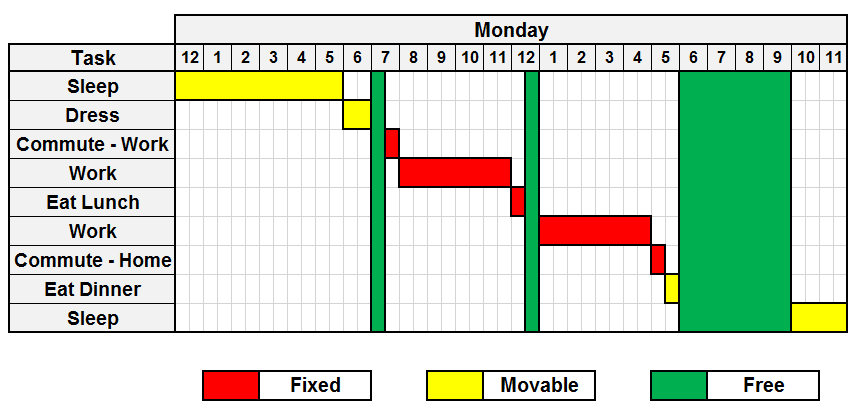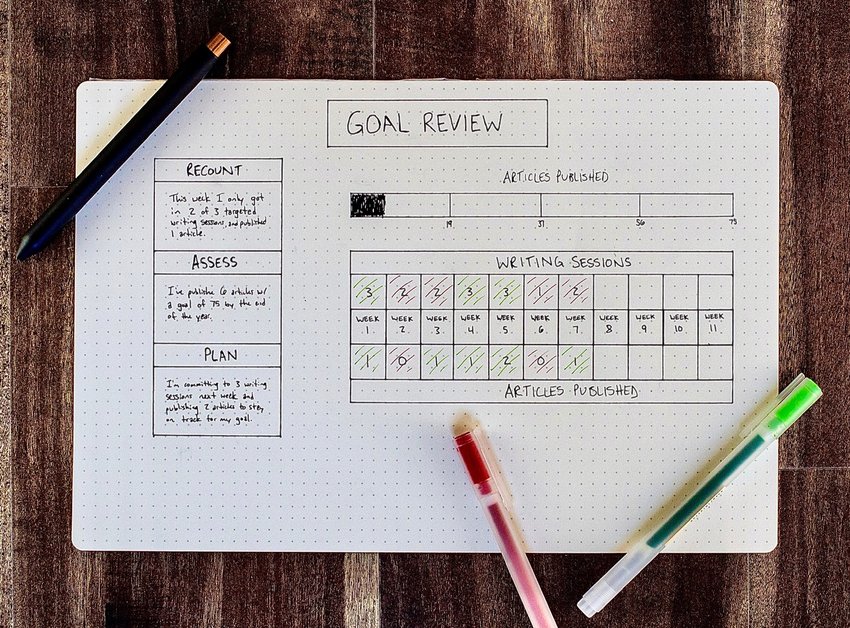 “How do you blog when you work full-time?!”
“How do you blog when you work full-time?!”
That’s an excellent question. And it’s one I used to ask myself.
I was a horribly inconsistent blogger. Granted, I’m still not the most productive example, but now I post much more often. And today, I’ll show you how to do the same.
As someone who works in a STEM field, I know how hard it is to blog after your brain’s been fried. But the following actions helped me brush limits aside and keep doing what I love. So hopefully, they’ll help you too.
How to Blog When You Work Full-Time: 10 Actions to Stay Active Online
#1 Simplify Your Schedule
“I can’t keep blogging! I have too much to do!”
Then stop having too much to do.
The reality of blogging is that it does take time. And if you can’t simplify your schedule, you’ll never do it consistently.
There are 120 hours in a five day work week. If you work 40 hours a week and sleep for 8 each night, that leaves you with 40 hours total. Remove an hour a day for time spent eating and another for your daily commute, and you’re left with 30 hours of “free” time (I say “free” because time is always devoted to something).
This means you have 6 hours each weekday to use.
To be a consistent blogger, you need to spend at least 10 hours a week on your blog. So if you can’t get that from the 6 hours each weekday and the time available on weekends, you have no chance.
This is why you have to review your schedule and see where you can trim the fat.

No, you probably won’t catch all your shows if you blog. But if some of your time is for childcare, you’ll have to work around that.
So make a list of your weekly actions and sort them by necessity. Then decide which ones you can shorten or cut altogether.
#2 Dedicate a Writing Environment
Every blogger needs a writing space.
You drive to your job every day for work, so why wouldn’t you choose a place where you write?
You need a dedicated writing environment to switch from job mode to blog mode.
I live at the library now for that reason.
My local library is quiet, it’s full of serious patrons like myself, and it has study rooms I can book if I need to ramp things up. I also use a white noise app to drown out random sounds while I’m there, and this strategy has helped a ton.
You should hit up a library too if you need a place to write. Sure, you could dedicate a room where you live instead, but there are far too many distractions at my place. Plus I’m used to doing other stuff at home, so I have to fight more resistance to get started.
Wherever you choose is fine though as long as you can concentrate, avoid distractions, and make writing the norm.
#3 Break Up The Writing Process
 Multitasking is one of the worst mistakes you can make as a writer.
Multitasking is one of the worst mistakes you can make as a writer.
You already send emails, answer phone calls, and make spreadsheets at work. The last thing you want to do is scramble your brain even more.
So don’t brainstorm, draft, and edit all at once. That’s too much work and it will overwhelm quick.
Rather, take each part of the writing process and do them on separate days.
Monday might be outline day for example, so the only thing you do then is make outlines. And instead of taking an idea from outline to draft in one night, you can batch ideas at the same time.
Doing this will keep you focused and also improve production. Instead of having one measly draft the next day, you’ll start with three outlines completed. And that’ll do wonders for your morale.
#4 Make Detailed Outlines
Speaking of outlines, you actually need to make them.
Writing is just ordering thoughts on a page, but to do that efficiently, you need to plan those thoughts beforehand.
Case in point, I hate writing first drafts—they require lots of focus and they are always bad—but my drafts practically write themselves when I make good outlines.
Look, I know some people like to freestyle their work, and if that’s what you do, more power to you. But if you’re like me and need a plan, it helps to write a post structure with key points at a minimum.
Doing this will give you a roadmap for your draft later. It will also reduce the thinking required and help you finish drafts faster.
I use a thorough process for my outlines—which you can see here—but no matter how you do it, please take this action seriously. Proper planning is essential to good, efficient writing. And you’ll waste plenty of time if you don’t discipline yourself early.
#5 Set Realistic Goals
Everyone’s heard of SMART goals by now.
You want your goals to be…
- Specific
- Measurable
- Achievable
- Relevant
- and Time-bound
But as someone who blogs with a full-time job, I can tell you that the Achievable and Relevant parts are most important.
You’ll need a posting schedule with solid deadlines to stay active. These deadlines should fit your blogging style and be goals you can actually meet.

I prefer long form content for example. Yes, I have some short articles, but I like writing 2,000 words on average.
Posts of this length require more research and planning. So as much as I’d like to post weekly, I know it’s not sustainable.
A goal that works better for me is 4,000 words a month. This goal fits my style better and it’s also achievable. I can write two posts of 2,000 words each month, or mix in short articles too. And at the end of the year, my production will still match the weekly blogger who writes posts of 1,000 words.
This is the thought process you need when setting a schedule. You have to determine the type of content you’ll post—whether short or long form—and set goals based on that length.
#6 Divide and Assign Tasks
One of the best time-saving actions I’ve made is dividing my open and closed-ended tasks.
I determine which actions have a clear finish line and which ones are more open in nature. Then I assign closed-ended tasks to weekdays and save open ones for the weekend.
Say I have two tasks to complete for example. One is research for a future post, and the other is editing a draft to a higher revision.
Research is more open-ended. There’s no clear line that says, “That’s enough.” So there’s a chance that this task will last longer than I expect.
Editing, however, has a clear end in sight. All I have to do is adjust the draft until it’s ready to rev up.
If I was planning when to do both actions, I’d assign editing to a weekday and do research on Saturday when I have more time.
I love this trick because it keeps me rewarded throughout the week. I knock out closed-ended tasks on weekdays instead of doing stuff I won’t finish quickly.
#7 Master Your “Free” Time
 Most jobs won’t concede six hours of undisturbed time. So if you want to stay active, you have to use blocks as best as you can.
Most jobs won’t concede six hours of undisturbed time. So if you want to stay active, you have to use blocks as best as you can.
If you work a traditional 9-(really-8)-to-5, then you have three potential sessions to write. You can finish a session before work, have a quick one at lunch, or complete it afterwards.
Keep in mind that your energy levels won’t be the same at each option though, so whatever combo you choose, make sure you’re at your best.
You’ll need to master this time off the clock since you won’t have many hours to spare. This means…
- You can’t procrastinate.
- You must be consistent.
- You have to limit distractions.
The daily choices you make add up over the weeks, and if you don’t commit to each session, you’ll fall off track.
Remember that you have to excel at the boring things. I know it’s hard to leave work and do even more work, but that’s what you signed up for. And the more “free” time you enjoy now, the more guilt you’ll feel later.
Get used to fighting internal resistance. No, you’re not too tired, you’re not too drained, and you’re not wasting your time. You just need to make the shift into writing mode.
One of the best ways to make this shift is to commit ten minutes.
Pick up your pen and work no matter what. Then see how you feel after ten minutes.
If you feel the same afterwards, you may need a rest day. But most times, your mood will change fast.
So do yourself a favor and start. You won’t want to stop the grind if you do.
#8 Piece Your Drafts Together
 Writing your draft in pieces is one of the best ways to avoid stress.
Writing your draft in pieces is one of the best ways to avoid stress.
Instead of trying to write the whole draft in one night, devote sessions to finish different parts.
It’s easier to write if you know you only need a small chunk. It also helps morale because you can meet this goal consistently.
This piecemeal strategy works with editing too. Just decide which section of the draft you want to edit, and then focus on completing it later.
Doing little by little this way adds up. So give your all to each piece of the puzzle, and the final picture will leave you amazed.
#9 Make Your Job Work for You
This one may sound sleazy, but you shouldn’t limit blog work to after hours.
I’m sure you have a few breaks through the day when you can at least get ideas flowing.
I mentioned your lunch break earlier, and that’s a great time to finish small tasks—especially if you get an hour.
Pack a lunch before work and eat for the first few minutes. It shouldn’t take more than fifteen to finish eating. So after you’re done, go to your car or break room to do some work.
It also helps to keep an idea log on the job too. I personally keep a stash of sticky notes that let me capture ideas through the day. I use these notes for my job too, so my actions always look work-related.

Once I finish my note, I put it in my drawer, my pocket, or some other place. Then once I leave, I gather notes from the day and stick them on my notebook.
Doing this will be tough if you don’t work at a desk or cubicle, but you still need a system to jot down ideas when you’re free.
Just make sure to write quickly and get back to work. If your boss sees you penning a whole draft on company time, don’t blame me.
#10 Take Care of Yourself
Finally, you need to take care of yourself.
Consistent blogging isn’t easy, and doing it with a full-time job is even harder. So don’t stress yourself out.
There will be times when you miss a deadline, post a dud, and lack energy. And that’s okay.
You’re a human, not a machine. As much as we’d all like to hit our goals, we have to acknowledge real limits.
You can’t let failure get you down. Just take a break instead.
Go out with friends. Take a day off. Hang with your spouse. Get your mind off it all.
There are more important things in life, so don’t neglect everything else.
Never forfeit your sleep either—I don’t care how much the extra hour or two will help. Sleep loss will kill your performance on the job and your blog.
The actions in this post should help you form a solid writing system, but if your life suffers at all, you need to step back.
Remember that your job still pays the bills anyway, so it always has priority—no matter what dudes on the internet say.
Part-Time Blogger, Full-Time Artist
 And that is how you do it.
And that is how you do it.
All these actions helped my production here at HFE. So if you’re a part time blogger who’s falling behind, or if you don’t think this is possible with a full-time job, I challenge you to give these a try.
Yes, it’s tough to leave work and do even more work. But if you don’t fight for your ideas, who will?
So go ahead and handle your business. And when things get tough, just remember:
Sacrifice is temporary. But art, lives forever.
-Drew
Excellent article. Thanks for sharing.
No problem. Glad I could help.